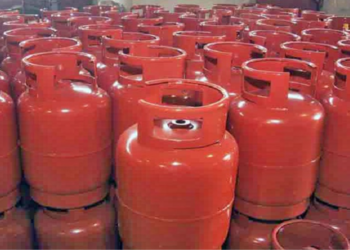Nigerians find cooking gas as a cheaper alternative to cooking compared to electricity-powered cookers, a recent finding from Nairametrics reveals.
Some, however, prefer electric cooking when they are on estimated billing, ostensibly because the bills are fixed even as they do not accurately account for power consumed.
Nairametrics interviewed several families about their experiences when cooking, mainly from a cost-saving perspective. Several of them explained why cooking with gas is more financially expedient relative to electricity or even solar.
The respondents told Nairametrics that they have four options for cooking their meals. These options are ranked according to affordability and sustainability. The options are LPG cylinders, electric stove using estimated billing, electric stove using the prepaid meter, and electric stove using solar panels.
While LPG is the cheapest, prices are not uniform across the country. Instead, marketers have varying prices according to location, determined by logistics costs and other factors. For example, LPG is more expensive in the southeast region compared to the northcentral region.
In addition, the recent cases of extreme flooding in 33 states across Nigeria have made logistics difficult, as some interstate roads have been cut off. Case in point, roads linking Rivers and Delta states to Bayelsa state have been cut off by extreme flooding. As a result, most residents in that area now have no access to supplies, thus driving LPG costs up.

Customers’ accounts of cooking on an estimated billing plan
According to Nairametrics’ surveys from customers spread across the country, LPG refill prices across the country ranged between N9,400 and N11, 500 for a 12.5kg cylinder as of October 16, 2022. Similarly, LPG refill prices for a 5kg cylinder ranged between N4,000 to N4,500.
Nairametrics spoke to some women who spend up to 20 hours a month, cooking meals for their families and found that these women only make use of electric stoves when they are on an estimated billing plan, where customers are charged directly for power consumed by the distribution companies (DisCos).
Lagos-based businesswoman Mrs. Chioma Ayalogu, who is on an estimated billing plan, told Nairametrics that she would never use her electric stove while on a prepaid meter. According to her, she can use her electric stove for more than 15 hours in a month and still pay less than N10,000. And that’s because she is currently on an estimated billing plan.
Of course, the amount charged will always be determined by the location as earlier noted. For instance, Mrs. Patricia Uwem who lives in a high-brow area in the country’s capital, Abuja, told Nairametrics that although she is on an estimated billing plan, she pays as much as N35,000 as a monthly power bill.
“I decided to start making use of a lot of my appliances, to justify the amount I was being charged, so, we started cooking with the electric stove, and surprisingly, the bill did not increase significantly. I guess the amount charged has a lot to do with our location,” she said.
What it costs to cook using electric stoves on a prepaid meter
Nairametrics estimates that if by October 1 a family of 3 in the southeast region refilled a 5kg LPG cylinder for N4,500, they can cook with the gas until October 27th before having to refill it.
However, if the same family should purchase a power token worth N4,500 from the Enugu Electricity Distribution Company (EEDC), it would not be enough to cover their cooking from October 1 to October 27 on the service-based tariff plan.
Oluchi Agu, an Enugu-based consumer who had used an electric stove to cook while on a prepaid meter, told Nairametrics that earlier in the year, she had bought a power token worth N5,000 and decided to cook using her electric stove because the power supply in her residential area was constant at the time and she wanted to save costs on her LPG cylinder. However, she discovered that she lost about 10 units after 2 and a half hours of cooking various dishes.
Cooking with an electric stove for over an hour will reflect more on prepaid meter units. If a user is on a Band A tariff, they will pay between N57 and N67 for access to power for 20 hours and above.
Nairametrics found that such customers will have to load up to N40,000 a month to adequately use their electric stoves while on prepaid meters.
Mrs. Bimbo Hassan, a housewife based in Delta State, told Nairametrics that her household only uses an electric stove to cook. According to her, the decision is a trauma response from an LPG cylinder home accident that happened some years ago at her home. She said:
“We only use electric stoves and our location has access to uninterrupted power supply, but we have to budget up to N150,000 a month for the purchase of prepaid meter units because ours is a large family and our power demands are quite high.”
However, cooking with LPG cylinders can be cheaper in the long run despite rising prices. An LPG user will be able to cook 30 times for an average of 2 hours per cooking session within two weeks using a 5kg cylinder for a family of three and two months for a family of three using a 12.5kg cylinder.
These estimates can change, depending on some factors, which include the location of the family, the kinds of food being prepared, and the frequency of cooking.
Electric stove with solar?
Further research by Nairametrics revealed that it is possible to run electric stoves on solar panels and batteries at home. However, a renewable energy expert who spoke to Nairametrics explained that for a Nigerian home to be able to operate on electric stoves regardless of weather conditions, there has to be a sufficient number of solar panels and batteries available in the house.
According to him, on the flip side, most Nigerians cannot afford this option because of the current inflation rate of 20.77% as of October 2022. Electric stoves running on solar panels and batteries could easily run the batteries down. So, customers are better off choosing other options.
What they are saying
Considering the environmental aspect of this subject matter, some experts argue that electric stoves are better for the environment compared to gas stoves.
- Chukwuemeka George Eze, an electrical engineer, and cleantech innovator told Nairametrics that electric stoves are more sustainable because they can be powered by renewable energy. Eze also believes that LPG usage is only a measure to avoid gas flaring, which is a greater consequence of fossil fuel exploration.
- Electricity lawyer and power systems expert, Ivie Ehanmo told Nairametrics that from an energy efficiency perspective, electric stoves are believed to consume less energy than gas for the equivalent amount of use.
- She said: “On the other end of the spectrum, gas is believed to be a better option in terms of overall carbon emissions as burning natural gas produces heat more efficiently than electric heat sources. The use of LPG causes minimal household pollution and negative health impacts as it emits fewer greenhouse gases than other cooking fuels.
- “The source of energy is a key determinant. If electricity is purchased from a company that supplies renewable energy, then an electric stove may be the better option in terms of carbon emissions. If otherwise, then gas may be a better option as electricity is believed to emit twice as much carbon as gas. The overall focus should be on switching to greener sources from renewable forms of energy to reduce one’s carbon footprint.”
Considering the costs of using electric stoves as opposed to LPG for cooking, Chukwuemeka George Eze told Nairametrics that the assets that generate electricity could have many years of useful life.
- He said: “If this asset is mainly solar or any other renewable source, it would have a useful life of at least 25 years. Since the cost of operation of such systems would be mostly hinged on the cost of the assets, if the cost of assets is then spread across 25 years, the cost per use becomes insignificant as compared to LPG.”
- This could be seen as a valid point, however, the issue of affordability and current purchasing power for solar panels and batteries, for instance, remains a pipe dream for a lot of Nigerians.
- Speaking on cost, Ivie Ehanmo reasons that electric cookers cost more to run than gas cookers, because they are twice as expensive in terms of the cost per unit (kWh), whether on prepaid or estimated billing.
Bottomline
- Despite rising prices, LPG is still the cheapest option for Nigerians across all societal statuses to cook their meals. LPG marketers still import LPG into the country, due to a lack of gas processing infrastructure, as well as other factors.
- However, the government announced in September 2022, that the Nigerian National Petroleum Company (NNPC) Limited is partnering with the office of Nigeria’s vice president, to deploy 740 LPG micro-distribution centers (MDCs), 37 filling plants, and skids in NNPCL’s 541 stations within the next three years.”















